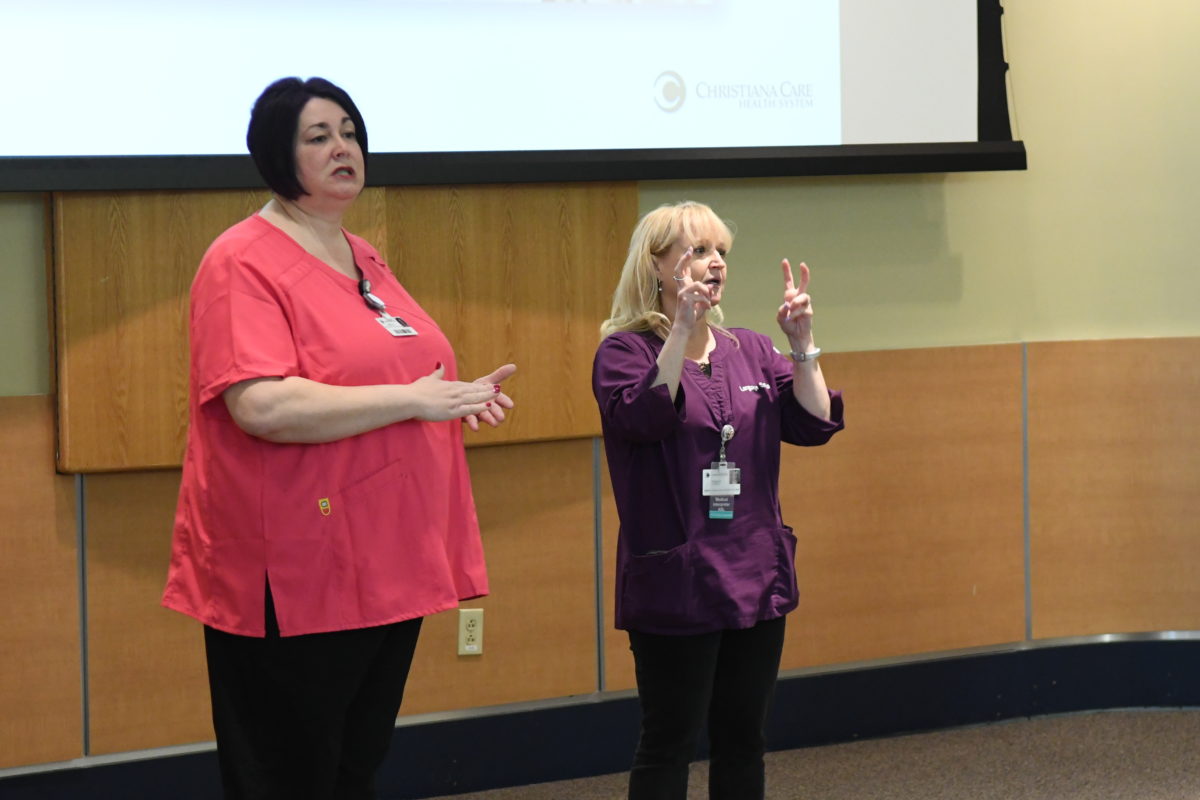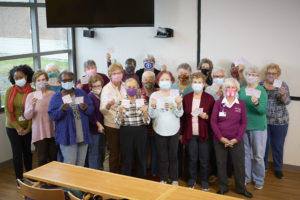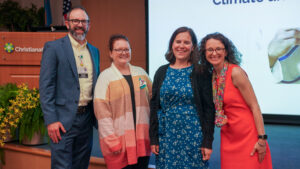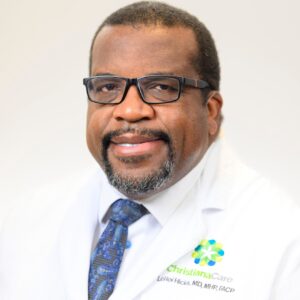Debra Fry of Newark might communicate in a language that uses signs instead of words, but at a recent Christiana Care Health System program on breast health and mammography, she got the message loud and clear — early detection saves lives.
As one of about 20 women to attend a special program at Wilmington Hospital specifically for deaf and hard of hearing women and their families, Fry asked a number of good questions, toured the mammography suite on the health system’s Wilmington campus, had the opportunity to meet trusted health care providers and encourage other members of the deaf and hard of hearing community to take charge of their own good health. Before she left the event, she took the ultimate step as an empowered advocate for her own well being — she had a screening mammogram.
She also walked away with the feeling that Christiana Care is committed to ensuring equitable access to health information and services for everyone in the community — including those who are deaf and hard of hearing.
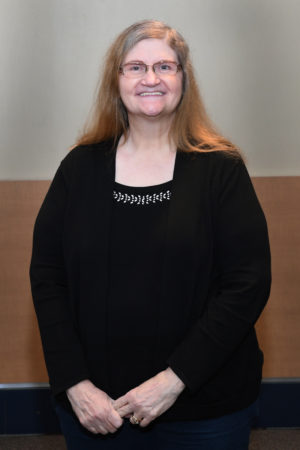
“I always try to go to Christiana Care so I have the same access as a hearing person,” said Fry, through sign language interpreter Tracy Gerry, NIC. “Thanks to this program, I now know how many places there are where Christiana Care offers mammography — and that American Sign Language interpreters are available to me at all of them. I will tell others!”
The educational outreach program was sponsored by Christiana Care Imaging Services with support from Christiana Care’s Office of Health Equity and the Community Health Outreach & Education Program. Medically qualified sign language interpreters, in their signature purple uniforms, were strategically positioned around the conference room to ensure that every woman in attendance had a direct view to the information being shared and could ask questions.
Radiology Technologist II Holly Deaney, RT (R) (M) (CBDT), explained that one in eight women will be diagnosed with breast cancer. The good news, she said, is that thanks to widespread education about the importance of early detection and advanced technologies for early detection, including 3D mammography now available at five Christiana Care locations, there are 28 million breast cancer survivors today.
Deaney educated the audience about the anatomy of the breast, discussed symptoms to share with a physician and explained exactly what happens — and what it feels like — to have a mammogram.
“Women have to protect themselves and be their own No. 1 advocate for good health,” she said.
Sign language interpreters also accompanied the women on tours of the mammography suite at Wilmington Hospital. Christy Hennessey, program coordinator for the deaf and hard of hearing at Independent Resources Inc., a nonprofit that serves people with disabilities which co-hosted the event with Christiana Care, said tours are particularly important in building trust with the deaf and hard of hearing because they are very visual people.
Hennessey was joined on the committee to plan and promote the event by: Jacqueline Ortiz, MPhil, director in the office of Health Equity; Michelle Marsilii, marketing representative for Christiana Care Imaging Services; Karen Miller, director of deaf ministries for Grace United Methodist Church; Carol J. Stevens, RN, deaf ministries area coordinator for The United Methodist Church, who is both a nurse and an interpreter; and Loretta Sarro, who works for the Delaware Office of Deaf and Hard of Hearing. Based on the success of the program, in which eight women had mammograms on-site and others left with scheduled appointments, the committee is already looking ahead to more outreach programs with Christiana Care for the deaf and hard of hearing community, including one on diabetes. They are also working hard to spread the word about Christiana Care’s interpretation resources.
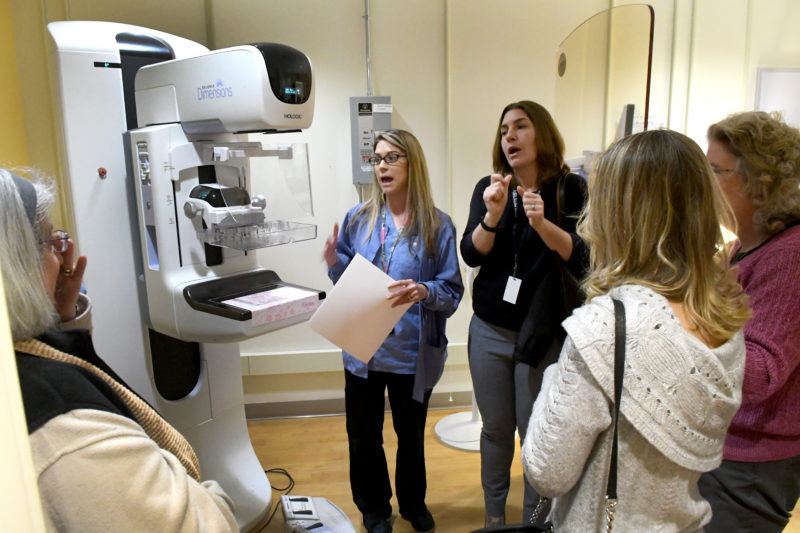
Opening doors to the deaf and hard of hearing community
Conversations with health care providers tend to be limited for women who are deaf and hard of hearing, the advocates said. Since the passage of the Americans with Disabilities Act in 1990, health care providers are required to comply by providing qualified sign language interpreters. If that is not done, some deaf and hard of hearing people are forced to rely on reading lips or must depend on family members to help with communication.
In many cases, only the most basic information is exchanged instead of engaging in meaningful dialogue that could lead toward important information for both the provider and the patient. For the deaf and hard of hearing community, they said, the challenge is less that they cannot hear than that, until now, no one has made a real effort to communicate with them.
With this program, Christiana Care hopes to change all that.
“Every one in our community should receive health information in a format they best understand, and have equitable access to services and resources to help them communicate with their care providers,” said Ortiz. “Everyone deserves an equal chance to be healthy.”
“The success of this program feels like we are opening doors to the deaf and hard of hearing community,” said Claudia Reyes-Hull, manager of Language Services. “For the first time, they feel like they are really being included in health outreach programs and noticed as a community that deserves the same services as hearing women.”
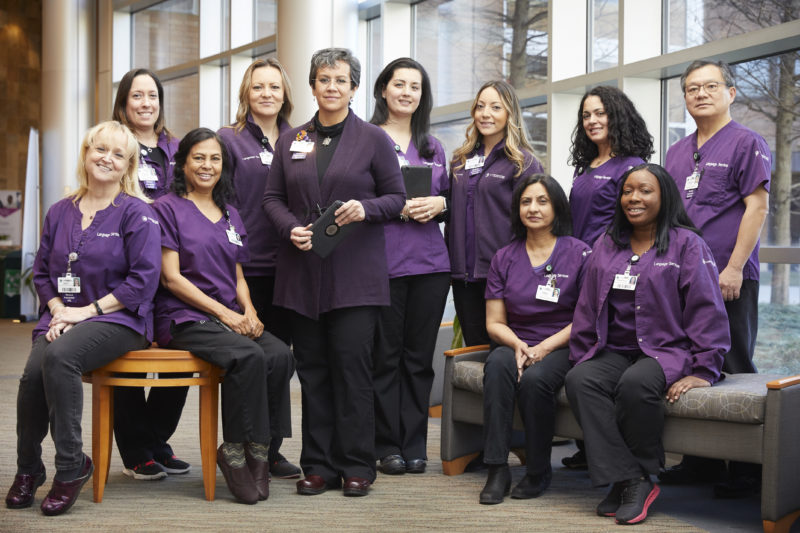
The event organizers described the program as “beyond successful.” To their knowledge, it was the first such outreach by a health provider in this region.
“The time for the deaf and hard of hearing community to be empowered as advocates for their own health is finally here, thanks to Christiana Care,” said Miller.
